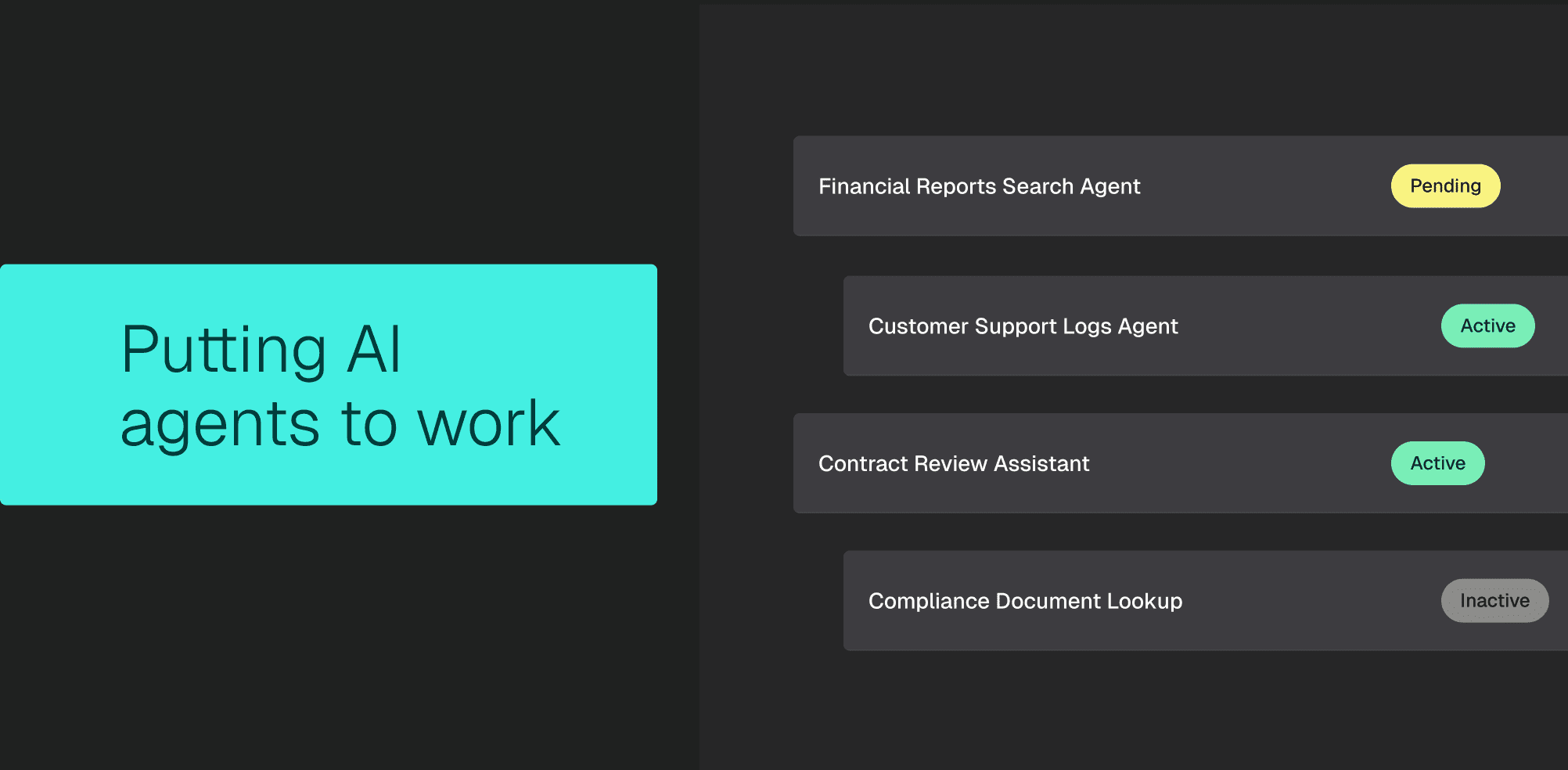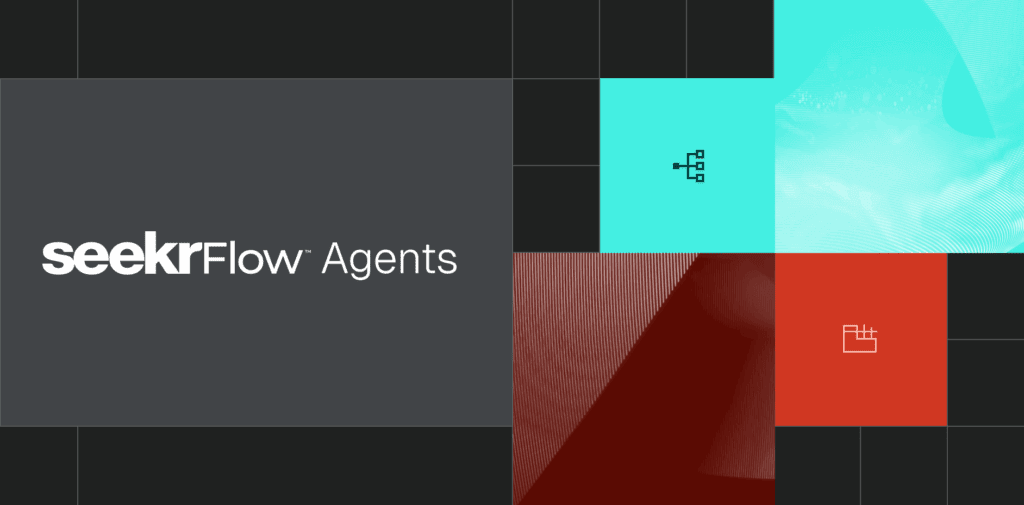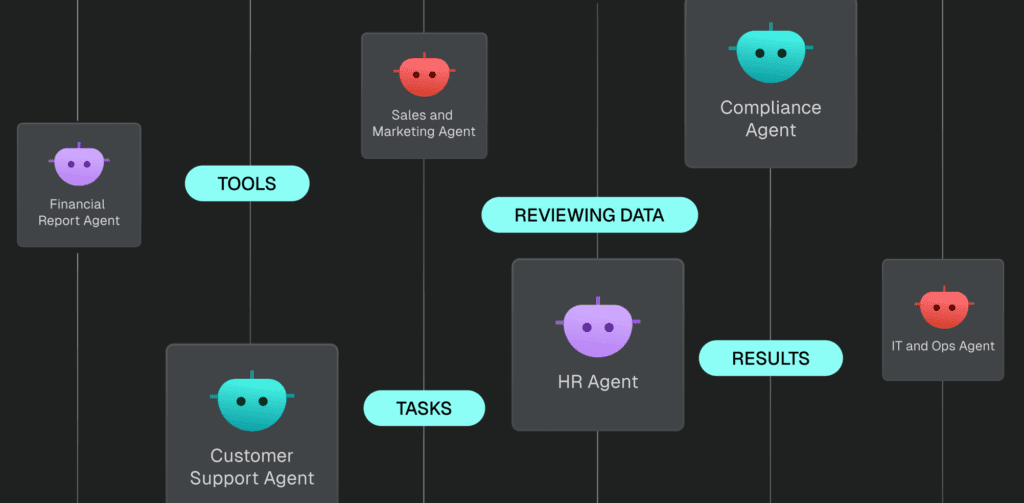Back to Blogs
Putting AI Agents to Work: Top Enterprise Use Cases to Start Building Now

With initial use cases showing real business value, AI innovation is moving fast. Enterprises are shifting from AI experimentation to AI optimization at scale. They’re now turning to AI agents that promise productivity, efficiency, and cost reduction benefits that are orders of magnitude greater than what was previously attainable.
Unlike simple chatbots or AI assistants that typically respond to a user prompt, AI agents are goal-oriented and capable of reasoning, acting, and learning in context. They can autonomously operate across systems, coordinate tasks, and continuously learn to improve outcomes and drive greater value over time.
But how does this powerful technology translate into tangible business value, and where can you start realizing it in your organization? In this blog, we’ll look at ten compelling enterprise use cases for AI agents already delivering measurable returns across industries.
Key takeaways
- Organizations looking to maximize the benefits of AI at scale are implementing AI agents.
- AI agents can reason, plan, act, and learn in real time to accomplish specific goals autonomously.
- Even companies in highly regulated industries can benefit from AI agents for use cases like fraud detection, supply chain automation, and personalized customer support.
- Choosing the right AI agent platform can make the difference between AI adoption failure and success.
- SeekrFlow™ Agents is a full-stack integrated solution built for enterprises to deploy intelligent agents that work autonomously, securely, and at scale.
Why AI agents are the next step in enterprise automation
AI agents exceed the capabilities of the current generation of GenAI applications, moving from completing individual tasks to completing projects. AI agents have the ability to:
- Pursue goals independently, defining their own path to success
- Autonomously make decisions, reflecting and refining actions based on feedback or failure
- Coordinate with other agents, components, and systems, with minimal human guidance
- Continuously evaluate, learn, and adapt in real time
This flexibility makes AI agents powerful assistants that can easily complete complex processes and overcome challenges like fragmented data, disconnected systems, and manual workflows, which limit productivity and innovation.
When designed with transparency and embedded in the right systems, AI agents can support businesses by handling repetitive tasks, simplifying complexity, increasing operational efficiency, and enabling more strategic decision-making.
Ten enterprise AI agent use cases delivering value now
Gartner reports, “AI agents have the potential to revolutionize client operations in a broad range of industries and environments with their ability to automate tasks, make informed decisions, and interact intelligently with their surroundings.”
The following use cases demonstrate the potential opportunity and return on investment (ROI) that AI agents can deliver across industry sectors.
1. Finance industry fraud detection
Financial institutions lose billions annually to fraudulent transactions, with traditional rule-based systems generating excessive false positives or failing to catch novel fraud patterns. AI agents can help to detect, flag, or block fraudulent activities by analyzing a wide swath of sources, including historical transaction data, fraud case files, customer profiles with normal behavior patterns, regulatory requirements, investigation procedures, and alert handling protocols.
2. Supply chain automation
Manufacturers and retailers face chronic supply chain disruptions and inefficiencies from manual processes, resulting in stockouts, excess inventory, and margin erosion. AI agents can automate and optimize supply chain decisions based on demand forecasts, supplier performance data, inventory levels, logistics constraints, risk assessments, seasonal demand patterns, and sustainability parameters. This helps organizations realize reductions in inventory carrying costs, improvements in order fulfillment rates, and reductions in stockout events.
3. AI-assisted cybersecurity
Security operations centers are overwhelmed by alert fatigue and sophisticated threats that bypass traditional defenses, leaving organizations vulnerable to breaches. AI agents can autonomously detect and respond to threats based on network behavior baselines, threat intelligence feeds, vulnerability databases, incident response playbooks, and compliance requirements. Outcomes include faster threat detection and response, and reductions in false positive alerts and security breach-related costs.
4. Autonomous customer support
Traditional customer service relies on human agents handling repetitive queries, which can lead to long wait times, inconsistent responses, high operational costs, and difficulty scaling during peak demand periods. AI agents can help improve consistency, scalability, and customer satisfaction based on analysis of customer profiles, prioritization frameworks, knowledge bases, historical ticket databases, response templates, troubleshooting procedures, and regulatory factors. This helps organizations improve first-contact resolution and reduce resolution time for escalated cases, potentially leading to increased customer satisfaction scores and ROI gains as improvements compound.
5. AI-assisted recruitment and talent screening
HR departments spend hundreds of hours manually screening unqualified candidates while struggling to identify top talent efficiently, resulting in prolonged hiring cycles and poor candidate experiences. AI agents can automate resume screening and candidate matching based on job requirements, skills databases, historical hiring data, assessment frameworks, diversity guidelines, and compliance regulations. With AI agents, organizations can benefit from reduced time-to-hire and improved quality-of-hire metrics.
6. AI-powered sales assistants
Sales teams waste valuable selling time on administrative tasks and lack real-time insights to optimize deals, resulting in lost opportunities and revenue leakage. AI agents can automate sales processes and provide intelligent recommendations based on CRM data, buyer intent signals, product catalogs, pricing rules, and historical win/loss analysis. Results lead to increases in sales productivity and improvements in deal conversion rates.
7. Dynamic pricing optimization
Businesses lose significant revenue through static pricing that fails to account for real-time market conditions, competitor actions, and demand fluctuations. Businesses can implement AI agents to continuously optimize pricing strategies based on demand forecasts, competitor pricing data, inventory levels, customer segmentation models, and revenue management rules. With this real-time data, organizations can realize increases in revenue and improvements in margin protection.
8. Media and publishing content personalization
Media companies struggle with declining engagement as generic content fails to resonate with diverse audiences, leading to high bounce rates and subscription churn. AI agents can analyze user reading history, engagement patterns, demographic data, content taxonomies, editorial guidelines, and monetization strategies to deliver hyper-personalized content recommendations. Personalized media content powered by agents results in more engaged readers and stronger subscription growth.
9. Hospitality and travel experience optimization
Hotels and travel providers face challenges delivering personalized guest experiences while managing operational complexity across properties, leading to inconsistent service and missed revenue opportunities. AI agents can automate and personalize the guest journey based on historical pricing performance, competitor positioning, demand forecasting, market response patterns, traveler preferences, booking history, and real-time feedback. Provider benefits potentially include reduced unbooked inventory, increased ancillary revenue per booking, improved guest satisfaction scores, and increased profit margin.
10. Intelligent marketing campaign execution
Marketing teams struggle to execute coordinated cross-channel campaigns at scale, leading to inconsistent messaging, wasted ad spend, and lower ROI. AI agents can optimize and execute campaigns autonomously based on analysis of customer segmentation models, channel performance data, creative asset libraries, budget allocation rules, and real-time engagement metrics. This can help organizations realize greater campaign ROI and reduce customer acquisition costs.
Challenges to overcome in AI agent adoption
AI agents have the potential to add great value to organizations. However, businesses must address several challenges to gain the most return while reducing risk. Unlike one-off tools, AI agent integration touches infrastructure, workflows, and governance. Its success hinges on deep integration within the enterprise environment and the ability to operate autonomously and securely while maintaining high standards of accuracy and efficiency based on an organization’s unique requirements.
Implementing AI agents using a range of point solutions can present challenges, including:
- Fragmented, complex, multi-vendor workflows
- Potential security and compliance risks if data is processed outside organizational boundaries
- Lack of AI model flexibility and domain depth expertise
- Limited or missing explainability features, reducing trust and making AI agent decisions hard to audit
- Performance limits and risk of data leakage if agents are run on shared infrastructure, making it hard to support high-demand, real-time applications
Simplifying your path to AI agent success
AI agents are set to transform enterprise operations across departments and industries, but building trustworthy agents requires the right tools. Fully integrated solutions that work out-of-the-box help enterprises address implementation challenges and more easily build, validate, deploy, and monitor AI agents.
At Seekr, we’ve spent the past year building an integrated full-stack solution grounded in the principles of trust, transparency, and real-world readiness. SeekrFlow Agents is designed to help enterprises build, deploy, and scale intelligent agents that are secure, explainable, and optimized for specific tasks and industries.
- SeekrFlow Agents gives you everything in one solution—including data preparation, model hosting, domain-specific fine-tuning, vector databases, orchestration, and explainability. This unifies workflows, removes dependencies, and enables you to customize your agents to your business or industry.
- With flexibility to run AI agents securely within your own environment—in the cloud or on-premises—ring-fenced execution, and full data control, you maintain ownership without compromising capability and compliance.
- Built-in explainability tools give users visibility into every step the agent takes, helping to ensure full auditability and compliance across industries where oversight matters.
- Deployed as dedicated endpoints, SeekrFlow AI agents provide guaranteed compute capacity and predictable, scalable performance so your agents can handle complex tasks and high throughput without compromise.
Learn more about SeekrFlow Agents and how it simplifies AI agent implementation and adoption, or connect with a product expert to explore how SeekrFlow Agents can take your business to the next level in your AI transformation.
Accelerate your path to AI impact
Book a consultation with an AI expert. We’re here to help you speed up your time to AI ROI.
Request a demo



